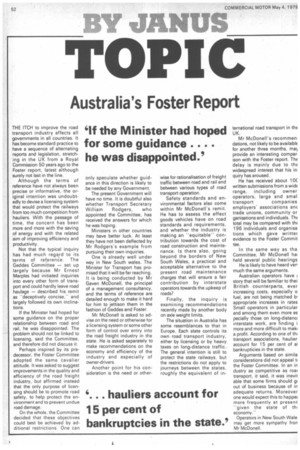Australia's Foster Report
Page 54

If you've noticed an error in this article please click here to report it so we can fix it.
'If the Minister had hoped for some guidance.
he was disappointed.'
By JANUS
THE ITCH to improve the road transport industry affects all governments in all countries. It has become standard practice to have a sequence of alternating reports and legislation, stretching in the UK from a Royal Commission 50 years ago to the Foster report, latest although surely not last in the line.
Although the terms of reference have not always been precise or informative, the original intention was undoubtedly to devise a licensing system that would protect the railways from too much competition from hauliers. With the passage of time, the concern has been more and more with the saving of energy and with the related aim of improving efficiency and productivity.
Not that the typical inquiry has had much regard to its terms of reference. The Geddes Committee — set up largely because Mr Ernest Marples had initiated inquiries into every other form of transport and could hardly leave road haulage — described his remit as -deceptively concise,and largely followed its own inclinations.
If the Minister had hoped for some guidance on the proper relationship between road and rail, he was disappointed. The problem should not be linked to licensing, said the Committee, and therefore did not discuss it.
Perhaps inspired by its predecessor, the Foster Committee adopted the same cavalier attitude. It was asked to suggest improvements in the quality and efficiency of the road freight industry, but affirmed instead that the only purpose of licensing should be to promote road safety, to help protect the environment and to prevent undue road damage.
On the whole, the Committee decided that these objectives could best be achieved by additional restrictions. One can only speculate whether guidance in this direction is likely to be needed by any Government.
The present Government will have no time. It is doubtful also whether Transport Secretary William Rodgers, who appointed the Committee, has received the answers for which he was hoping.
Ministers in other countries may bave better luck. At least they have not been deflected by Mr Rodgers's example from pursuing their own inquiries.
One is already well under way in New South wales. The Minister for Transport has promised that it will be far reaching. It is being conducted by Mr Gaven McDonell, the principal of a management consultancy, and the terms of reference are detailed enough to make it hard for him to jettison them in the fashion of Geddes and Foster.
Mr McDonell is asked to advise on the need or otherwise for a licensing system or some other form of control over entry into the road freight industry in the state. He is asked separately to make recommendations on the economy and efficiency of the industry and especially of owner-drivers.
Another point for his consideration is the need or other wise for rationalisation of freight traffic between road and rail and between various types of road transport operation.
Safety standards and environmental factors also come within Mr McDonell's remit. He has to assess the effect goods vehicles have on road standards and requirements, and whether the industry is making an -equitablecontribution towards the cost of road construction and maintenance. Is there also, going beyond the borders of New South Wales, a practical and acceptable alternative to the present road maintenance charges that will ensure a fair contribution by interstate operators towards the upkeep of roads?
Finally, the inquiry is examining recommendations recently made by another body on axle weight limits.
The situation in Australia has some resemblances to that in Europe. Each state controls its own road transport industry, either by licensing or by heavy taxes on long-distance traffic. The general intention is still to protect the state railways, but the restrictions do not apply to journeys between the states, roughly the equivalent of in ternational road transport in thE UK.
Mr McDonell's recommen. dations, not likely to be availablE for another three months, ma) provide an interesting compar ison with the Foster report. TN delay is mainly due to thE widespread interest that his in quiry has aroused.
He has received about 10( written submissions from a with range, including owner operators, large and smal transport companies employers' associations an trade unions, community or ganisations and individuals. Th( total may be compared with thi 196 individuals and organisa tions which gave writter evidence to the Foster Commit tee.
In the same way as tha Committee, Mr McDonell ha: held several public hearings He is likely to have heard ver much the same arguments.
Australian operators have ; story that will be familiar to thei British counterparts, ever increasing costs, especially o fuel, are not being matched b' appropriate increases in rates Small operators in particular and among them even more es pecially those on long-distand interstate work, are finding i more and more difficult to mak a profit. According to one of thi transport associations, haulier account for 15 per cent of al bankrupticies in the state.
Arguments based on simile considerations did not appeal ti the Foster Committee. In an in dustry as competitive as mai transport, it said, it was inevit able that some firms should çji out of business because of in adequate returns. Moreover one would expect this to happei more frequently at present "given the state of HT economy."
Operators in New South Wale may get more sympathy fror Mr McDonell.
























































































































